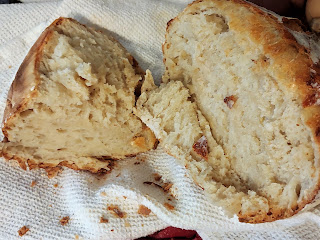Bread and Wine: Sullivan Street Bread
I am not so sure that I am fit to write today. It has been a long week, made longer by a few toddler emergencies at the end. But I am here, at the table, and that--the showing up--has been largely what this blog is about. So I am.
I have made bread, so please, pull up a chair with me, one last time, and let's eat.
The Recipe: Sullivan Street Bread
Ingredients: white flour, yeast, water, salt, olive oil
The bread I made with my mother when I was growing up was a full-day affair--four rises total, a LOT of kneading, a LOT of flour and Crisco, a lot of forming and patting (maybe this is why it's hard for me to let things simmer, I grew up cooking Fidgety!) I loved the soft white loaves that came out of the oven (and still do! Thanks, Mama!), but I was, and am, frequently daunted by the eight-hour process.
If your experiences with bread have been less than fun, than the Sullivan Street Bread recipe is therapy, because it happens with so little effort on your part. I encountered it a few years ago via friend who made it constantly at the holidays (the recipe was popularized by the New York Times several years ago). I was fascinated, but intimidated by more bread. Apparently I just need Shauna to break it down for me.
It requires a little patting and moving, yes; a little fidgeting with the oven, yes; keeping a watchful eye on it, yes, but otherwise that's it. Far from intense, it's almost more of a letting go; gently mixing ingredients together and letting them do their thing. Kind of freeing, actually. A metaphor of grace.
I made this bread for this last blog, but I have made it maybe six or seven times since I began reading Bread and Wine. It is easy and delicious; good for grilling sandwiches when not simply slathering with butter. Last Easter I made three loaves in different pots and it was fun to ooh and ahh over each one coming out of the oven. I learned that Dutch ovens work best for the final bake, but so do covered casserole dishes.
The Chapter: "Take This Bread"
Bread.
Church.
Grace.
Table.
Communion.
These things are all of a part together, I'm learning. I didn't really get this growing up, not until I started cooking more for more myself. Not until I had to choose a church on my own. Not until I had to wrestle with my faith on my own, as an adult.
When I was little, I remember the freshly baked Communion bread at my childhood church and thinking in my five-year old brain,- "Yeah! Snack time!" which it was not, and yet was.
Snack time. A feeding. Both sacred and incredibly common. My poor parents, trying to impress upon me a sense of solemnity and reverence for the sacraments, tried to instruct me on the fact that this is NOT to be taken lightly. And I know, I KNOW it is not. But I think I had to learn and relearn along the way that while the bread and wine are so sacred, representative of the holiness of Almighty God, they are both so normal, so elemental to everyday human life. And this is the trick, the game of the faith, of LIFE--both so, so holy and sacred. And yet so, so obviously normal, the things we run into every day.
Maybe I, maybe we, can tend to treat cooking the same way. Something for the big time, the celebrity chefs, the experts, the high priests of lifestyle brands, instead of something to be celebrated, partaken, enjoyed and shared. every.single.day.
If I let it, every meal I make becomes a sacrament, a reminder and a partaking in God's providence and goodness.
Every time I take Communion in church AND every time I break bread--or enchiladas or burgers or mousse-- with others is an opportunity to proclaim God's goodness and His providence for us on every level--physical and spiritual.
Everyday cooking is holy work if we let it be.
I love Shauna's closing reflections:
I believe the bread and wine is for all of us, for every person, an invitation to believe, a hand extended from divine to human. I believe it's to be torn and handled, gulped...
I believe that Jesus asked for us to remember him during the breaking of the bread and the drinking of the wine every time, every meal, every day--no matter where we are, who we ae, what we've done....
If we only practice remembrance every time we take Communion at church, we miss three opportunities a day to remember. What a travesty! Eugene Peterson says that 'to eyes that see, every bush is a burning bus.' Yes, that, exactly. To those of us who believe that all of life is sacred, every crumb of bread and sip of wine, is a Eucharist, a remembrance, a call to awareness of holiness right where we are.
Right where we are.
Amen.



Comments
Post a Comment